Fleurs du Mal Magazine



Song:
Sweetest love, I do not go
Sweetest love, I do not go,
For weariness of thee,
Nor in hope the world can show
A fitter love for me;
But since that I
Must die at last, ’tis best
To use myself in jest
Thus by feign’d deaths to die.
Yesternight the sun went hence,
And yet is here today;
He hath no desire nor sense,
Nor half so short a way:
Then fear not me,
But believe that I shall make
Speedier journeys, since I take
More wings and spurs than he.
O how feeble is man’s power,
That if good fortune fall,
Cannot add another hour,
Nor a lost hour recall!
But come bad chance,
And we join to’it our strength,
And we teach it art and length,
Itself o’er us to’advance.
When thou sigh’st, thou sigh’st not wind,
But sigh’st my soul away;
When thou weep’st, unkindly kind,
My life’s blood doth decay.
It cannot be
That thou lov’st me, as thou say’st,
If in thine my life thou waste,
That art the best of me.
Let not thy divining heart
Forethink me any ill;
Destiny may take thy part,
And may thy fears fulfil;
But think that we
Are but turn’d aside to sleep;
They who one another keep
Alive, ne’er parted be.
John Donne
(1572–1631)
Song: Sweetest love, I do not go
• fleursdumal.nl magazine
More in: Archive C-D, Archive C-D, Donne, John
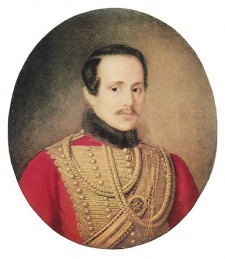
Mijn dolk
Ik sloot jou in mijn hart, mijn maat, mijn dolk,
Sinds jaar en dag mijn onderkoelde kameraad,
Gesmeed werd jij door vrijgevochten ruitervolk,
Geslepen door een christenhart vervuld van haat.
Door lelieblanke hand wist jij jouw heft omvat,
Als aandenken aan wat – aan wíe – ik achterliet,
In plaats van bloed vergleed er langs jouw blad
Een opgewelde traan – een parel van verdriet.
Haar rokerige ogen vast op mijn persoon gericht,
Vervuld van onbenoembaar, onuitspreekbaar leed,
Verschoten, vlamden dan weer op, in haar gezicht,
Zoals jouw kling dat in het laaiend kampvuur deed.
Zij maakte jou mijn metgezel, haar liefdespand,
De vagebond in mij volgt steeds jouw wijze raad,
Ja, trouw ben ik haar, ik doe mijn woord gestand,
En jij, jij houdt mij bij de les, mijn kille kameraad!
Michail Lermontov,
Mijn dolk, Кинжал (1838)
(1814 – 1841)
Vertaling Paul Bezembinder
Paul Bezembinder studeerde theoretische natuurkunde in Nijmegen. In zijn poëzie zoekt hij vooral in klassieke versvormen en thema’s naar de balans tussen serieuze poëzie, pastiche en smartlap. Bij uitgeverij Leeuwenhof (Oostburg) verschenen de bundels Gedichten (2020), Parkzicht (2020) en Duizelingen (2022). Website: www.paulbezembinder.nl
• fleursdumal.nl magazine
More in: - Archive Tombeau de la jeunesse, Archive A-B, Archive A-B, Archive K-L, Archive K-L, Bezembinder, Paul, Lermontov, Lermontov, Mikhail
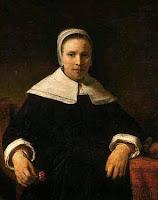
To My Dear and Loving Husband
If ever two were one, then surely we.
If ever man were loved by wife, then thee;
If ever wife was happy in a man,
Compare with me, ye women, if you can.
I prize thy love more than whole mines of gold,
Or all the riches that the East doth hold.
My love is such that rivers cannot quench,
Nor ought but love from thee give recompence.
Thy love is such I can no way repay;
The heavens reward thee manifold, I pray.
Then while we live, in love let’s so persever[e],
That when we live no more, we may live ever.
Anne Bradstreet
(1612 – 1672)
To My Dear and Loving Husband
• fleursdumal.nl magazine
More in: # Classic Poetry Archive, Archive A-B, Archive A-B, Bradstreet, Anne
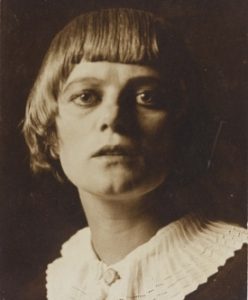
Ein Traum
Wir liegen in einem tiefem See
Und wissen nichts von Leid und Weh.
Wir halten uns umfangen
Und Wasserrosen rings um uns her.
Wir streben und wünschen und wollen nichts mehr.
Wir haben kein Verlangen.
Geliebter, etwas fehlt mir doch,
Einen Wunsch, den hab ich noch:
Die Sehnsucht nach der Sehnsucht.
Emmy Hennings
(1885 – 1948)
Ein Traum
• fleursdumal.nl magazine
More in: Archive G-H, Archive G-H, Emmy Hennings, Hennings, Emmy, Performing arts
« Je voulais raconter ça, l’histoire d’une famille de pasteurs qui perd la mémoire. Traiter d’un drame, avec le plus de lumière possible. » 〈Emma Doude van Troostwijk〉
Le temps d’un séjour de quelques semaines dans sa maison d’enfance, la narratrice raconte ses retrouvailles avec sa famille, où, depuis trois générations, hommes et femmes ont choisi le métier de pasteur. Mais quand elle arrive, quelque chose de cet ordre ancien s’est profondément déréglé.
 Plongez, grâce à ce subtil premier roman, dans l’atmosphère enveloppante et mystérieuse d’un presbytère. Un premier roman aux charmes puissants, tout en clair-obscur, serti de détails lumineux. Un livre bouleversant sur la mémoire, l’oubli et la puissance de la narration – pour retisser du lien.
Plongez, grâce à ce subtil premier roman, dans l’atmosphère enveloppante et mystérieuse d’un presbytère. Un premier roman aux charmes puissants, tout en clair-obscur, serti de détails lumineux. Un livre bouleversant sur la mémoire, l’oubli et la puissance de la narration – pour retisser du lien.
Une grande découverte ! 〈Gallimard〉
Emma Doude van Troostwijk écrit un premier roman éminemment original. Son originalité est à la fois narrative et formelle. L’histoire est sombre, pourtant ceux qui la vivent restent libres. 〈Le Monde〉
Ceux qui appartiennent au jour
par Emma Doude Van Troostwijk
Roman Francais
Date de parution: 2 Janvier 2024
Éditions Minuit
EAN 9782707349484
Nombre de pages: 176
Longueur 18.5 cm
Largeur 13.5 cm
Épaisseur 1.5 cm
Broché
€ 17.00
• fleursdumal.nl magazine
More in: - Book Lovers, - Book News, - Bookstores, Archive C-D, Archive S-T, Art & Literature News, Emma Doude Van Troostwijk

Marriage Morning
Light, so low upon earth,
You send a flash to the sun.
Here is the golden close of love,
All my wooing is done.
Oh, all the woods and the meadows,
Woods, where we hid from the wet,
Stiles where we stayed to be kind,
Meadows in which we met!
Light, so low in the vale
You flash and lighten afar,
For this is the golden morning of love,
And you are his morning star.
Flash, I am coming, I come,
By meadow and stile and wood,
Oh, lighten into my eyes and my heart,
Into my heart and my blood!
Heart, are you great enough
For a love that never tires?
O heart, are you great enough for love?
I have heard of thorns and briers.
Over the thorns and briers,
Over the meadows and stiles,
Over the world to the end of it
Flash of a million miles.
Alfred Lord Tennyson
(1809-1892)
Marriage Morning
• fleursdumal.nl magazine
More in: Archive S-T, Archive S-T, Tennyson, Alfred Lord
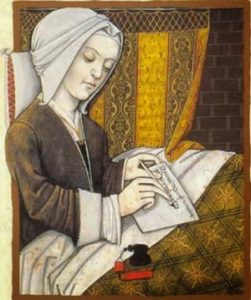
Belle, ce que j’ay requis
Belle, ce que j’ay requis
Or le vueilliez ottroier,
Car par tant de fois proier
Bien le doy avoir conquis.
Je l’ay ja si long temps quis,
Et pour trés bien emploier,
Belle, ce que j’ay requis.
Se de moy avez enquis,
Ne me devez pas noyer
Mon guerdon, ne mon loier;
Car par raison j’ai acquis,
Belle, ce que j’ay requis.
Christine de Pisan
(1364/1365 – 1430)
Belle, ce que j’ay requis
Rondeaux
• fleursdumal.nl magazine
More in: # Classic Poetry Archive, Archive O-P, Archive O-P, Pisan, Christine de, The Ideal Woman
Het grootste overzicht ooit in Nederland van de legendarische kunstenaar Marina Abramović!
 Ruim 60 belangrijke werken tonen de ontwikkeling van het indrukwekkende oeuvre van de pionier van de performancekunst in de afgelopen vijftig jaar: van haar vroege werk, dat ze maakte in het voormalige Joegoslavië en in Amsterdam, tot de baanbrekende performances met haar partner Ulay en het solowerk waarmee ze nog steeds actief is.
Ruim 60 belangrijke werken tonen de ontwikkeling van het indrukwekkende oeuvre van de pionier van de performancekunst in de afgelopen vijftig jaar: van haar vroege werk, dat ze maakte in het voormalige Joegoslavië en in Amsterdam, tot de baanbrekende performances met haar partner Ulay en het solowerk waarmee ze nog steeds actief is.
Te zien zijn foto’s, video’s, sculpturen en live heruitvoeringen van vier iconische performances die voor het eerst worden uitgevoerd in Nederland: Art Must Be Beautiful, Artist Must Be Beautiful (1975), Imponderabilia (werk met Ulay) (1977), Luminosity (1997) en The House with the Ocean View (2002). Als bezoeker kun je zelf ook deelnemen aan twee werken: Work Relation (werk met Ulay) (1978) en Counting the Rice van de Abramović Methode.
There are so many different forms of art, performance is one of the most difficult, the most immaterial, and the most real.
— Marina Abramović
 Marina Abramović is sinds de jaren 70 een prominente figuur in de performance- en body art en wordt beschouwd als een van de belangrijkste grondleggers van deze kunstvorm.
Marina Abramović is sinds de jaren 70 een prominente figuur in de performance- en body art en wordt beschouwd als een van de belangrijkste grondleggers van deze kunstvorm.
Ze bracht de performancekunst van het experimentele begin naar de mainstream. Ze gebruikt haar eigen lichaam en test de grenzen van haar fysieke en mentale uithoudingsvermogen.
Samen met haar geliefde Ulay, die ze in 1975 in Amsterdam ontmoet, wordt ze wereldwijd beroemd met langdurende performances waarin zij hun grenzen tot het uiterste op de proef stellen.
In haar latere solowerk richt zij zich meer op het verkennen van spiritualiteit en het creëren van een wisselwerking, waarin het publiek actief onderdeel wordt van haar werk en een gedeelde energie.
Marina Abramović
Tentoonstelling — 16 mrt t/m 14 jul 2024
Stedelijk Museum Amsterdam
• fleursdumal.nl magazine
More in: Archive A-B, Art & Literature News, Art Criticism, Exhibition Archive, Marina Abramović, Performing arts, Photography, Sculpture
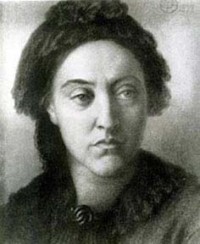
Spring
Frost-locked all the winter,
Seeds, and roots, and stones of fruits,
What shall make their sap ascend
That they may put forth shoots?
Tips of tender green,
Leaf, or blade, or sheath;
Telling of the hidden life
That breaks forth underneath,
Life nursed in its grave by Death.
Blows the thaw-wind pleasantly,
Drips the soaking rain,
By fits looks down the waking sun:
Young grass springs on the plain;
Young leaves clothe early hedgerow trees;
Seeds, and roots, and stones of fruits,
Swollen with sap put forth their shoots;
Curled-headed ferns sprout in the lane;
Birds sing and pair again.
There is no time like Spring,
When life’s alive in everything,
Before new nestlings sing,
Before cleft swallows speed their journey back
Along the trackless track–
God guides their wing,
He spreads their table that they nothing lack,–
Before the daisy grows a common flower,
Before the sun has power
To scorch the world up in his noontide hour.
There is no time like Spring,
Like Spring that passes by;
There is no life like Spring-life born to die,–
Piercing the sod,
Clothing the uncouth clod,
Hatched in the nest,
Fledged on the windy bough,
Strong on the wing:
There is no time like Spring that passes by,
Now newly born, and now
Hastening to die.
Christina Georgina Rossetti
(1830 – 1894)
Spring
• fleursdumal.nl magazine
More in: 4SEASONS#Spring, Archive Q-R, Archive Q-R, Rossetti, Christina
“Sla je op de vlucht om iemand te vergeten of om diegene juist dicht bij je te houden? Zul je diens lelijke kopjes ooit terugvinden in de kringloopwinkel? Hoeveel koeiendagen heb je nodig voor je weet hoe je moet rouwen?”
 De dood waart in verschillende gedaantes rond door de derde dichtbundel van Kira Wuck.
De dood waart in verschillende gedaantes rond door de derde dichtbundel van Kira Wuck.
Gelukkig weet zij ook hoe je verdriet kunt verleggen. Troost blijkt onder meer te vinden bij andere lichamen, een heelal boven je bed of in de Burger King.
Soms moet je simpelweg weer eens echt goed naar jezelf kijken, om te zien :
‘hoe mijn ledematen zich konden uitvouwen zodat ze jou zachtjes konden raken als het riet’.
Kira Wuck (1978) is dochter van een Finse moeder en een Indonesische vader. Ze groeide op in Amsterdam, maar voelt zich thuis bij het absurdisme en de melancholie uit de noordelijke landen. Voor haar poëziedebuut Finse meisjes ontving ze de Lucy B. en C.W. van der Hoogtprijs en nominaties voor de C. Buddingh’-Prijs en de Jo Peters PoëziePrijs. Ook haar verhalenbundel Noodlanding, haar tweede dichtbundel De zee heeft honger en haar debuutroman Knikkerkoning werden zeer goed ontvangen.
Koeiendagen
Kira Wuck (auteur)
Uitgever: De Geus
Eerste editie (18 januari 2024)
Taal: Nederlands
Paperback: 64 pagina’s
ISBN-10: 9044549863
ISBN-13: 978-9044549867
Afmetingen: 15 x 22 cm
Paperback
€18,99
• fleursdumal.nl magazine
More in: #Modern Poetry Archive, - Book News, - Bookstores, Archive W-X, Archive W-X, Wuck, Kira
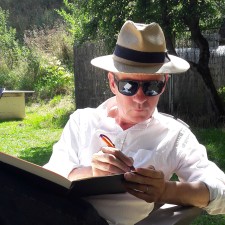
Na de dag
Het licht heeft je gezicht verweerd
en de marok wil met je aan de haal,
barok wordt rococo, de wijn creëert
de tralies voor de panter van de taal.
De wind steekt op, sirocco of simoem,
rhizomen worden schaars, de gentiaan
verdorst, de iris wordt een zonnebloem
en aan de hemel dient de maan zich aan.
Paul Bezembinder
Na de dag
Gedicht
Paul Bezembinder studeerde theoretische natuurkunde in Nijmegen. In zijn poëzie zoekt hij vooral in klassieke versvormen en thema’s naar de balans tussen serieuze poëzie, pastiche en smartlap. Bij uitgeverij Leeuwenhof (Oostburg) verschenen de bundels Gedichten (2020), Parkzicht (2020) en Duizelingen (2022). Website: www.paulbezembinder.nl.
• fleursdumal.nl magazine
More in: #Editors Choice Archiv, Archive A-B, Archive A-B, Bezembinder, Paul
Award-winning poet Maya C. Popa suggests that our restless desires are inseparable from our mortality in this pressing and precise collection.
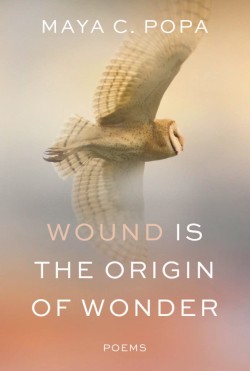 Rooting out profound meaning in language to wrench us from the moorings of the familiar and into the realm of the extraordinary, the volume asks, how do we articulate what’s by definition inarticulable? Where does sight end and imagination begin?
Rooting out profound meaning in language to wrench us from the moorings of the familiar and into the realm of the extraordinary, the volume asks, how do we articulate what’s by definition inarticulable? Where does sight end and imagination begin?
Lucid and musically rich, these poems sound an appeal to a dwindling natural world and summon moments from the lives of literary forbearers―John Milton’s visit to Galileo, a vase broken by Marcel Proust―to unveil fresh wonder in the unlikely meetings of the past.
Popa dramatizes the difficulties of loving a world that is at once rich with beauty and full of opportunities for grief, and reveals that the natural arc of wonder, from astonishment to reflection, more deeply connects us with our humanity.
Maya C. Popa is a naturally gifted poet, lucidly engaged with the most profound questions we face in our collective responsibilities and our relations with each other. She writes with love and wonder of a world poised at a perilous moment: “My children, will they exist by the time / it’s irreversible?” she asks. “Will they live / astonished at the thought of ice / not pulled from the mouth of a machine?”
To read her poems is to pause again and again at the precision of imagery, breadth of ideas, and the warmth and generousness of her lyric voice.
Maya C. Popa is the poetry reviews editor at Publishers Weekly and teaches poetry at New York University.
Wound Is the Origin of Wonder: Poems
by Maya C. Popa (Author)
Publisher: W. W. Norton & Company
November 8, 2022
Language: English
Hardcover: 96 pages
ISBN-10: 1324021365
ISBN-13: 978-1324021360
Hardcover $21.49
Paperback $15.99
• fleursdumal.nl magazine
More in: #Modern Poetry Archive, - Book News, - Bookstores, Archive O-P, Archive O-P, Popa, Maya C.
Thank you for reading Fleurs du Mal - magazine for art & literature